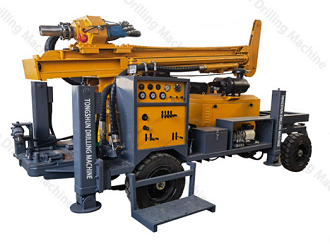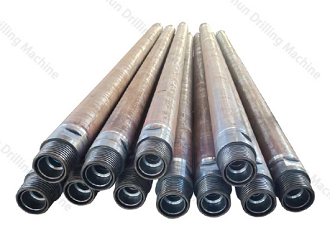Geotechnical drilling is a specialized and critical method to study and explore the materials beneath the ground. It involves drilling into the ground to obtain information about the soil and rock layers beneath the surface. It helps evaluate the ground's stability, strength, and physical properties, ensuring that structures are built on solid foundations. This process is crucial in the planning phase of any construction project, as it helps prevent unforeseen complications that may arise from unknown subsurface conditions.
In the geotechnical industry, various drilling methods are used, each tailored to specific project needs and geological conditions. These methods include:
- Rotary Drilling: This rapid drilling technique uses rotary motion to penetrate the Earth, making it ideal for drilling through hard rock layers, creating large holes, obtaining rock samples for deep analysis, and exploring coal deposits.
- Core Drilling: Core drilling extracts a cylindrical sample of the ground material, providing critical information about the soil and rock layers. This data is essential for designing foundations, bridges, and tunnels.
- Direct Push Drilling: Utilizing a percussion hammer, this method pushes tools and sensors directly into the ground without removing soil. It's an efficient way to collect groundwater samples and assess soil conditions, especially for contamination analysis.
- Mud Rotary Drilling: Known for its speed and versatility, this method uses drilling mud fluid to remove cuttings and stabilize the borehole. It's highly effective for coring bedrock and maintaining borehole integrity.
The success of geotechnical drilling projects heavily depends on the quality and durability of the drilling equipment. Two important types of equipment are the hollow stem auger and large-diameter drilling rigs. The hollow stem auger is used in softer ground conditions like sands, silts, or clay, allowing simultaneous drilling and casing while collecting soil samples and enabling well installation. Large-diameter drilling rigs, designed for larger holes ranging from 100 mm to 150 mm in diameter, are crucial for large-scale construction projects that require deep, wide boreholes.
Geotechnical drilling plays a pivotal role across various industries, particularly in construction and civil engineering. It serves as the foundational step in assessing soil bearing capacity for construction projects, ensuring that the ground can support the intended structure. This process is crucial for the safety, stability, and longevity of structures ranging from residential homes to large-scale infrastructure projects. In civil engineering, geotechnical drilling supports the design of bridges, roads, and other critical infrastructure by helping identify potential hazards that may arise during construction.
The procedures involved in geotechnical drilling are meticulous and purpose-driven. Core drilling methods extract cylindrical samples of soil and rock, providing direct insights into the subsurface conditions, which are essential for making informed construction decisions. Geotechnical drilling also facilitates the installation of monitoring instruments, which are vital for assessing how the ground responds to construction activities and natural changes over time.
Another critical aspect of geotechnical drilling is the selection of boring locations. This decision is carefully planned based on the project's goals and the initial site assessments. Proper placement of boreholes is essential to ensure that the data collected is comprehensive and accurately reflects the subsurface conditions, contributing to a reliable geotechnical analysis.
Geotechnical drilling is a vital process that provides significant value to clients by ensuring the safety and successful completion of their projects. Through this process, clients obtain essential data, such as soil stability, composition, and bearing capacity, all of which are crucial for maintaining quality control in construction. This valuable information enables well-informed decision-making, reducing potential risks and preventing costly mistakes. Moreover, comprehensive geotechnical reports offer a thorough understanding of the job site, benefiting both immediate project needs and serving as a reference for future requirements.
For property owners, geotechnical drilling represents an investment in the long-term durability of their structures. By gaining an in-depth understanding of the soil and subsurface conditions, property owners can design robust foundations tailored to the unique characteristics of the site. This knowledge directly impacts the structural integrity and longevity of any building, providing a solid foundation for a secure and sustainable investment.


Copyright © Jinzhou City TongShun Drilling Machine Co.,Ltd. All Rights Reserved Sitemap | Powered by 